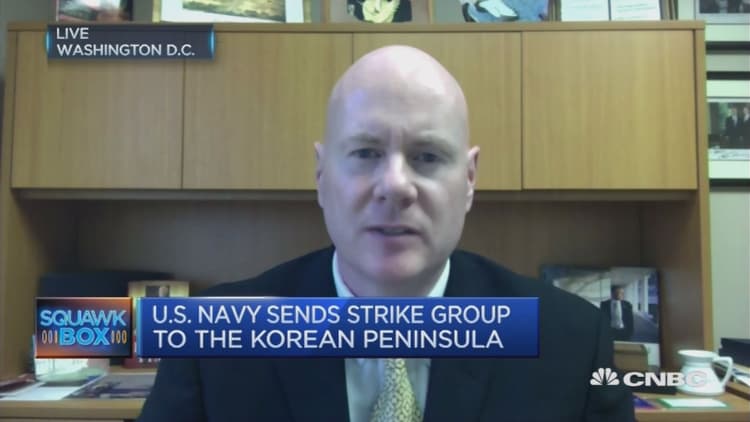As of last week, President Donald Trump's foreign policy vision remained mired in fog. Now, recent developments show an administration that's ready to go on offense.
From attacking a Syrian government airfield on Thursday to moving an aircraft carrier group closer to North Korea on Sunday, the White House seems to be pursuing an aggressive approach to reign in rogue nations.
"Clearly, what the Syrian situation does is illustrate that the Trump administration is willing to use force," Adrian Mowat, managing director and chief Asian/EM equity strategist at J.P. Morgan, told CNBC on Monday.
The American airstrikes on the war-torn nation took many by surprise. Trump was known for his nonintervention stance on the matter and previously warned against U.S. involvement — in 2013, the Republican tweeted "we should stay the hell out of Syria."
Now marked down as one of the president's numerous policy flip-flops, strategists haven't ruled out the possibility of further U.S. action in Syria, noting Washington's continued presence in the region.
"Since the missile strike, the U.S. has continued to fly sorties over Syrian airspace. They have been flying F22s, the most advanced fighters you can put in that airspace, to make sure the Syrians don't respond by turning on their air defense systems or the Russians don't retaliate," said Richard Fontaine, president of policy think-tank The Center for a New American Security.
The same heavy-handed attitude applies to Pyongyang, who has been ramping up its nuclear threats in recent months.
Following a failed ballistic missile launch on March 22 and the firing of four missiles towards the Sea of Japan on March 6, the pariah state test-launched yet another ballistic missile last Wednesday ahead of Trump's summit with Chinese President Xi Jinping.

The White House has called for a radical overhaul of U.S. policy towards Pyongyang, a strategy reflected in Sunday's decision to deploy the USS Carl Vinson Carrier Strike Group nearer to the Korean Peninsula. Strategists called the measure escalatory but the U.S. Pacific Command's intention was to maintain readiness and presence in the region, according to its statement.
"After the strikes on Syria, this is seen largely as another demonstration effect," said Stephen Yates, CEO of DC International Advisory, referring to Sunday's news.
North Korea, who considers Syria an ally, has called Washington's actions in the Middle Eastern country "evermore reckless moves for a war," adding that incidents like these justified Pyongyang's need for nuclear weapons.
"The (Trump) administration is reviewing its options for how to deal with North Korea but all of them seem to be trending towards the more coercive side of the ledger," said Fontaine.

